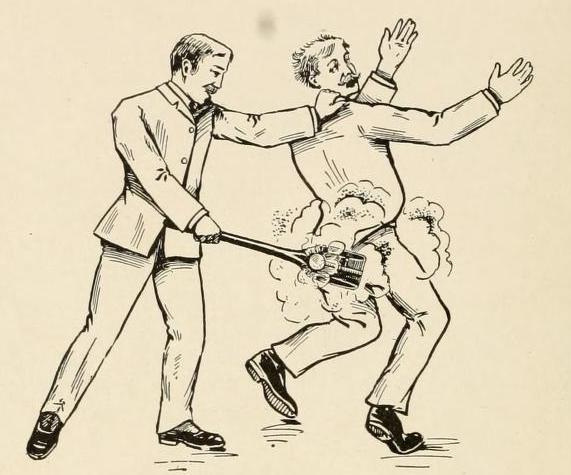
Update (November 6, 2020): It took the Board of Professional Responsibility more than three years to get to this point but, by clear and convincing evidence, earlier this week they finally issued “Findings of Fact, Conclusions of Law, Recommendations for Discipline,” finding several ethics violations by Minneapolis lawyer, Dan Biersdorf.
Mr. Biersdorf is the subject of our post, below, from over a year ago in connection with a professional malpractice lawsuit brought against Mr. Biersdorf and his law firm.
Mr. Biersdorf apparently testified under oath before the Board of Professional Responsibility that it is not his responsibility to know the Minnesota Rules of Civil Procedure although he admits that he and his firm practice civil litigation (See here at p. 7, Finding of Fact No. 27). (One has to assume the firm’s clients get no disclaimer (“If you want to follow the applicable rules of civil procedure in the civil litigation we are handling for you, that’s on you”?) He also appears to have sought to avoid personal responsibility by putting the blame on a junior lawyer at Biersdorf’s small firm. (See here at p.11, Finding of Fact No. 53). (So much for “the buck stops here.”)
By clear and convincing evidence, the Minnesota Board of Professional Responsibility, through Sr. Judge Heather L. Sweetland, found that Mr. Biersdorf failed to act competently in violated of Rule 1.1 of the Minnesota Rules of Professional Conduct. He was found to have violated Rule 1.3 in failing to act with reasonable diligence and promptness when he learned that he had failed to file his client’s lawsuit within one year of serving the lawsuit, as required by Rule 5.04 of the Minnesota Rules of Civil Procedure. He was found to have violated Rule 1.4(a) in communicating to his client about the failure to file the lawsuit within the year as required by the rule.
Further, Mr. Biersdorf’s firm billed its client for a court filing fee, collected the money from the client, never paid the filing fee, took the money and, a year later, gave the client a “partial refund.” (See here at p. 9, Finding of Fact No. 45.)
This is all on top of six private disciplinary actions that Mr. Biersdorf has received over 44 years of practice. (See here at p. 10, Finding of Fact No. 49.)
Public reprimand may be cold comfort for a client who spent years and a substantial amount of money dealing with the fall-out from a lawsuit that was thrown out due to attorney error. On the other hand, the long-in-coming discipline is a vindication of sorts; it is also an important signal to Minnesotans generally and Minnesota lawyers, in particular. No one expects lawyers to be perfect or omniscient but, at the same time, it is appropriate that they be held to professional standards and it is appropriate that they are called to task when they fall short.

Original Post (May 22, 2019) (under the headline: Too Lousy a Lawyer to Be Liable for Malpractice?): We recently concluded a legal malpractice lawsuit (Johnson et al. v. Biersdorf, et al.) in which counsel for the defendant lawyers argued that the defendant lawyers could not be liable for professional negligence because the underlying litigation, which the defendant lawyers had spear-headed, was a total loser. We characterized the position as doubling-down on incompetence: Not only did the lawyers foul up the case by missing a critical deadline but, they argued, when they sued in the first place, it was an unwinnable case (which, we argued, was not what they had advised their client). Thus, they argued, they could not be held liable for missing the critical deadline (or for the tens of thousands of dollars of fees that they billed their client).
That is, defense counsel argued that a plaintiff claiming professional malpractice against a Minnesota lawyer in connection with their conduct in litigation could never succeed or recover anything if the underlying litigation was unwinnable.
One can only bring a lawsuit for “litigation malpractice,” they argued, if the malpractice plaintiff can show that “but for” the lawyer’s malfeasance, the malpractice plaintiff would have won the underlying case (this is the so-called case-within-a-case model of a legal malpractice claim).
We strongly objected. What if lawyers encouraged their clients to undertake completely bogus lawsuits from the get-go (without informed consent, of course, which would be a different story)? No claim for professional malpractice ever, under any circumstances? Defense counsel was adamant that this is the law in Minnesota.
Of course, in our view, this argument was dead wrong.
The courts seem to agree with us.
This week, for example, the Minnesota Court of Appeals affirmed a malpractice case against attorney Herbert Igbanugo for several immigration claims that he handled that were D.O.A. The plaintiffs were not obligated to prove that “but for” Mr. Igbanugo’s alleged malfeasance, they would have obtained better results. They could not have gotten better results. Mr. Igbanugo’s apparent malpractice was the undertaking of (and charging money for) their allegedly destined-for-failure cases.
We are happy that a “too-incompetent (or devious)-to-be-liable defense” seems to be a losing defense to a claim for professional negligence in Minnesota.
